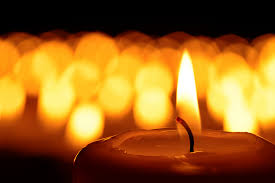By Stan Johnston

“Dad’s gone.” My mind registered the words from my brother on the phone, but I couldn’t let the reality of my father’s death incapacitate me. In five minutes I had to leave my Los Angeles hotel room, meet co-workers, and give a crucial presentation to about 5,000 people. Sometimes the overlap of personal and work life is out of your control. In those times, the love of co-workers can be the difference.
Yes, I said love. More on that later, because we should start with why love is needed in times of loss. If you work side-by-side with someone for years, your lives become entwined. And if you are a decent human being, you care about what hurts your friends. Nothing is more painful than the loss of a loved one. When it happens to a co-worker, it can impact your team – and you – on a deeply emotional level.

I thought about that as I read the tributes to former First Lady Barbara Bush, who passed away last week at age 92. Recognition and appreciation came from heads of state, family, legislators, religious leaders, friends, and many others. But tucked among the responses was a poignant account from Jean Becker, a longtime co-worker of both Barbara Bush and her husband George H.W. Bush.
Becker served as deputy press secretary for Mrs. Bush from 1989 to 1992 and helped to edit her two books. She has been chief of staff for Mr. Bush since 1994 and helped him write a book, too. Most of us knew H.W. as our president, so we grieve the loss of his wife of 73 years from a distance. But after 30 years of working with both closely, Becker cannot. She was deeply moved by Barbara’s loss, recounting for us the couple’s final hours:

“He held her hand all day today and was at her side when (she) left this good earth. Obviously, this is a very challenging time. It will not surprise all of you who know and love him, that he also is being stoic and strong, and is being lifted up by his large and supportive family.”
It had to be a tough time for Becker, too. That’s why these comments are insightful:
- “He of course is brokenhearted.”
- “He is determined to be there for them as well.”
- “He appreciates all the well wishes and support.”
While personally grieving, people need to feel both useful and supported. Here are some thoughts on how:
Don’t pressure people to stay away from work.

Most people need to be needed, so don’t isolate them more than they already feel in times of loss. Peter CaJacob, former VP of Human Resources at McClatchy, was a longtime boss and remains a friend. When my father died, he advised me to keep giving my mom things to do for our family. He told me how his family had responded to the death of his mother by taking pretty much everything off his father’s plate. The intentions were good, but Pete was convinced his dad passed away soon after because he simply didn’t feel useful anymore.
Don’t take so much off your co-worker’s plate that they feel insecure and unimportant. Let them know you’re filling the gap but miss and appreciate them. For me, it was important to get back to work quickly and get my mind on something else. But it also helped that my co-workers were sensitive and patient when I got distracted.
H.W. Bush shifted his focus to supporting the people around him. After my father died, I found solace in helping people around me get things done at home and work. It was healthy for all of us, and co-workers allowed me to do it.
Express that you care – it matters.

For almost four years, I worked daily at Hewlett-Packard in a cube across from Dave Kamp, one of the most delightful human beings I ever met. We shared increasingly intimate details about our lives, which is natural as you become friends. Dave was always encouraging — about personal life, not just business.
After he was diagnosed with terminal cancer, many current and former colleagues rallied to his support. When he died last year, Dave had so willingly invested in workplace friendships that many tears were shed over his loss, yet there were few outlets for expressing it.
The last time we talked, in Las Vegas a few months before he died, Dave recounted how the support of former co-workers had hugely lifted his spirits in the darkest time of his life. He just regretted he didn’t have a chance to tell everyone.
Don’t take it personally if a thank-you card is months later, or not at all. But send one. Grief is a process, not an event. People go through denial, isolation, anger, bargaining, and depression before coming to accept their loss. They appreciate support even when they don’t (or can’t) express it. Recently I found some sympathy cards from colleagues after my father died. I probably never thanked people for sending them. But they mattered then and now.
Know when you need to grieve, too.
H.W. Bush was open that he was brokenhearted. So was Becker, and she remained close to her longtime friends to the end. Helping others through loss when you are hurting can be a profound human experience.
A very public example of that came five years ago, when actor Cory Monteith died of a drug overdose at age 31. He played popular character Finn Hudson on the TV show Glee. His girlfriend on screen and in real life, Lea Michele, was devastated. But she returned to work three weeks later and sang a tearful farewell on-air as character Rachel Berry — performing “Make You Feel My Love” by Bob Dylan (and made famous by Adele).

By returning to her job and expressing her deep feelings through music, Michele helped millions of fans work through their grief. Her authentic expression of love also was cathartic to grieving co-workers, on and off screen. Love has that kind of impact on the healing process.
We rarely discuss love in the workplace apart from romantic relationships. But we neglect it at great risk. I truly loved Dave Kamp as a friend, and I will hold his memory forever with great affection.
In the era of the Multi-National Enterprise and distributed teams, sorrow is amplified in isolation and peace is elusive in an open office. Because of that, maybe my best advice to handling workplace loss comes from “Make You Feel My Love”: @byStanley
@byStanley
